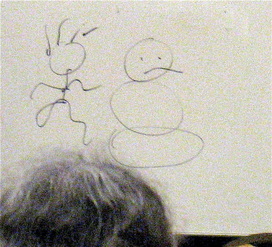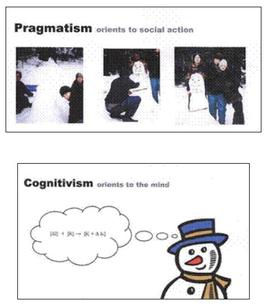Metatheoretical SnowmenMetatheoretical Snowmen is a thought experiment to explore the nature of metatheory in information science using the concept of a snowman. It was originally my poster at the 2005 ALISE annual meeting (Boston, MA) and was later developed into a panel presentation at the 2009 (Vancouver, BC) and 2011 (New Orleans, LA) ASIS&T Annual Meetings, and the 2010 CoLIS conference (London, UK). The ASIS&T Bulletin published an article about Metatheoretical Snowmen in its July/August 2012 issue.
This unconventional approach to understanding metatheory has since caught on among educators and versions of the Metatheoretical Snowmen panel have been implemented at the School of Library and Information Studies, Florida State University (where it was adapted as "Metatheoretical Flamingos") and the School of Information and Library Science, Pratt Institute (where it was adapted as "Metatheoretical Lions," among other information studies programs. OverviewMetatheory is the highest level conceptual device used in research and determines a way of thinking and speaking about reality and its information behavior. Today, numerous metatheories exist in information studies and create a dynamic climate; yet they also create some confusion. This panel demistifies methatheory by addressing the matter in a playful, comparative, competitive spirit. Articulate champions of five major metatheories have an opportunity to cast their metatheory onto the life and information experience of an ordinary and affable persona: a snowman. The vivid renderings of the snowman and its information world brings the features of each metatheory into clear view. To invigorate both discussants and the audience, the presentations are judged by a jury appointed on the spot. The panelist who offers the most illuminating exposition takes home a trophy while the audience gains new understanding.
BackgroundMetatheory is, “the philosophy behind the theory, the fundamental set of ideas about how phenomena of interest in a particular field should be thought about and researched” (Bates, 2006, p. 2). A commitment to a metatheory orients research and suggests a methodology and the meaning of major concepts of study. Unlike a field such as biology, that operates within one dominant paradigm (the theory of evolution), information science is an interdiscipline with many metatheories in play. This has always been the case: 75 years ago, the first textbook on library science tellingly acknowledged sociological, psychological, and historical perspectives (Butler, 1933). Recently, in a landmark book on information behavior (Fisher, Erdelez & McKechnie, 2005), Bates identified 13 metatheories and noted, “we now have a confusion of many approaches competing for attention.” In short, one can glean that metatheory: 1.) Is a critical clarifying device for research; 2.) Leads to different perspectives on information behavior; and 3.) Is an unruly topic for students and experts alike.
The Snowman TrophyTo motivate the panelists, the event is staged as a competition. Which speaker offers the most lucid and compelling presentation? At the beginning of the session, a jury of three judges is drawn from the audience, composed of a senior academic; a junior academic; and a student. In real time, the jury ranks each presentation on a scale of 1 (“incomprehensible!”) to 10 (“eureka!”). The presenter with the highest score is awarded the Snowman Trophy which is held for a year or until the next Metatheoretical Snowmen panel, which engages a different set of metatheories. At the conclusion of the session, a discussant provides synthesizing observations. Each speaker is timed and kept on schedule to allow a minimum of 30 minutes for audience questions and discussion.
Hall of FameThe following scholars have won their session of Metatheoretical Snowmen:
Dr. Pamela McKenzie (Constructionism/Discourse Analysis), ASIS&T Annual Meeting, 2009 Dr. Jonathan Furner (Philosophical Analytic)/Dr. Siobhan Stevenson (Political Economy), CoLIS, 2010* Dr. Michael Olsson (Critical Theory), ASIS&T Annual Meeting, 2011 * This session had a confounding, surprise outcome. Dr. Jonathan Furner’s statement on the philosophical-analytic approach was awarded a dual score by a judge who deemed it both "incomprehensible (1 point) and "eureka!--brilliant" (10 points). As a result, depending upon application, Dr. Furner finished either fifth or first (or rather fifth and first). And so, Dr. Furner shared the Metatheoretical Snowmen trophy with Dr. Stevenson (political economy) who had the second highest score. Interestingly, this was an application of a central tenet of Dr. Mai’s metatheory, pluralism, which "challenges unitary meanings." Past PresentersIn three iterations of the panel the following scholars have presented a metatheoretical snowman:
Jonathan Furner (Philosphical-analytic) Associate Professor, Department of Information Studies, University of California, Los Angeles. Dr. Furner presented the philosophical-analytic approach, in which the classical techniques of the discipline of philosophy are brought to bear on information-related matters (Bates, 2005, p. 11). [PDF presentation slides] [audio file with slides] Ross Todd (Cognitivism) Associate Professor, School of Communication, Information & Library Studies, Rutgers University. Dr. Todd represented cognitivism, a metatheory in which “the thinking of the individual person operating in the world is the dominating focus of research on information seeking, retrieval, and use” (Bates, 2005, p. 13). Birger HjØrland (Domain analysis/Socio-cognitivism) Professor, Royal School of Library and Information Science. Dr. HjØrland presented domain analysis (socio-cognitivism) a position in which “both the individual’s thinking and the social and documentary domain in which the individual operates are seen to influence the use of information” (Bates, 2005, p. 12). Jens-Erik Mai (Pluralism) Associate Professor, Faculty of Information, University of Toronto. Dr. Mai addressed pluralism, a position that challenges unitary meanings and understandings and instead promotes diversity and multiple meanings and understandings of information and categories. Siobhan Stevenson (Political economy) Assistant Professor, Faculty of Information, University of Toronto. Dr. Stevenson represented the political economy perspective, which provides analytic tools and concepts based on Marx’s general theory of capitalism that enhance our ability to interpret and respond to contemporary social, economic, cultural and political conditions associated with the transition to “information” societies. Howard D. White (Bibliometrics) Professor Emeritus, College of Information Science and Technology, Drexel University. Dr. White represented bibliometrics, a metatheory in which “the analysis of the statistical properties of information is seen to provide understanding of value for both the design of information provision and the theoretical understanding of social processes around information, including historical processes” (Bates, 2005, p. 13). Pamela McKenzie (Constructionism/Discourse Analysis) Associate Professor, Faculty of Information and Media Studies, University of Western Ontario Dr. McKenzie addressed constructionism (discourse analysis), an approach in which “it is assumed that the discourse of a society predominately conditions the responses of individuals within that society, including the social understanding of information” (Bates, 2005, p. 11). Paul Solomon (Sense-Making) Associate Professor, School of Library and Information Science, University of South Carolina Dr. Solomon interpreted Sense-Making, a set of metatheoretic assumptions for understanding how people overcome discontinuity. Soo Young Rieh (User-Centered Design) Associate Professor, School of Information, University of Michigan. Dr. Rieh represented user-centered design, in which “the development and human testing of information organization and information system designs is seen as a path to both scientific understanding and improved information access” (Bates, 2005, p. 13-14). Mike Olsson (Critical Studies) Senior Lecturer, Journalism, Information & Media Studies Group, University of Technology, Sydney. Dr. Olsson championed critical studies, an approach in which “the hidden power relations and patterns of documentation within society are revealed and debunked” (Bates, 2005, p. 11). Marcia Bates (Evolutionary Approach) Professor Emerita, School of Education and Information Studies, UCLA. Dr. Bates addressed an evolutionary stance, in which “the insights of biology and evolutionary psychology are brought to bear on information-related phenomena” (Bates, 2005, p. 14). Nicolas Belkin (Cognitive Viewpoint) Professor, School of Communication, Information & Library Studies, Rutgers University. Dr. Belkin represented the cognitive viewpoint, a perspective arising out of cognitive science in which “the thinking of the individual person operating in the world is the dominating focus of research on information seeking, retrieval, and use” (Bates, 2005, p. 13). [PDF presentation slides] Photos from Metatheoretical Snowmen (CoLIS 2010 and ASIS&T 2011)Past DiscussantsThe Metatheoretical Snowmen panels have been enlivented by dynamic discussants, including:
Dr. Marcia Bates, ASIS&T Annual Meeting, 2009 Dr. Steve Fuller, CoLIS, 2010 Dr. Andrew Dillon, ASIS&T Annual Meeting, 2011 Metatheoretical Snowmen at ASIS&T SIG-CON (2011)
SIG-CON is an annual comedy event at the ASIS&T Annual Meeting. At the 2011 session in New Orleans, one SIG-CON skit involved a game of Pictionary and the word to draw was ethnomethodology. Someone in the audience yelled out, "Draw a snowman!"
The photo at left was taken by Erica Hendry of the Faculty of Information, University of Toronto; and that's the head of historian Michael Buckland. ReferencesBates, M. J. (2005). An Introduction to metatheories, theories, and models. In K. Fisher, S. Erdelez, & L. McKechnie (Eds.), Theories of information behavior: A Researcher's guide (pp. 1-24). Medford, NJ: Information Today.
Butler, L. P. (1933). An Introduction to Library Science. Chicago: University of Chicago Press. Fisher, K.E., Erdelez, S., & McKechnie, L. F. F. (2005). Theories of information behavior: A Researcher’s guide. Medford, NJ: Information Today, Inc. |

